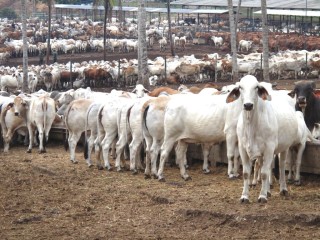 Cattle Council of Australia has slammed Federal Government action designed to extract industry funds to finance a $5 million compensation package in the wake of the recent Indonesian live export market closure.
Cattle Council of Australia has slammed Federal Government action designed to extract industry funds to finance a $5 million compensation package in the wake of the recent Indonesian live export market closure.
The grassfed beef producer peak council body says any industry capital should be spent only on efforts to re-open the trade.
In a statement issued this afternoon, CCA says it does not support the use of beef producers’ money through levy reserves to assist with the resolution of the domestic supply chain issues associated with the Government’s decision to suspend cattle exports to Indonesia (see previous story 'Industry to reject Govt compo order').
“CCA is strongly of the view that grassfed levies are best utilised on industry initiatives that are directly aimed at delivering services that facilitate a recommencement of the trade as soon as possible,” the statement said.
CCA vice president, Andrew Ogilvie, a beef producer from SA’s Naracoorte district, said during a telephone hook-up last night, his council had unanimously rejected the approach by Federal Ag Minister Joe Ludwig.
“Any process to get the trade up and running again is going to require a lot of time, money and effort,” he said. “It’s in that area that the cattle industry sees the most appropriate expenditure of industry funds – certainly not in some form of compensation to stakeholders affected by the Government’s own decision to close the trade,” Mr Ogilvie said.
“The Government itself took the decision to apply a total suspension, instead of winding it back to a core group of abattoirs that are known to use appropriate slaughter practices. It now has an obligation to clean up its own mess, rather than try to leverage off industry funds.”
Mr Ogilvie said CCA would be ‘100 percent’ behind using contingency funds to reactivate the trade – provided it was on industry-specified or approved programs.
Should Sen Ludwig go ahead with his threat to implement the compensation plan using mandatory acquisition of industry funds, Cattle Council would have to consider its legal position, he said.
“There would be a lot of messy politics if that was to occur,” Mr Ogilvie said.
Asked about reports that Minister Ludwig himself might be coming under pressure within Labor Party ranks over his handling of the Indonesian live export issue, Mr Ogilvie said he preferred not to comment. However he said Sen Ludwig himself had visited Indonesia in March, and had failed to visit abattoirs to educate himself about the complexities of the trade.
“We are prepared to work with the Minister – we always have been. But on this issue, we think he is totally wrong in asking industry to pick up the tab for compensation.”
“The problem is he is only thinking of the cattle in the holding depots. This impact goes far further than that – it is impacting on transport operators, indigenous communities, rural councils – the flow-on effect in monetary terms is huge. That $5 million is likely to blow out exponentially if nothing is done, and industry is not going to be locked into a position where that could happen.”
Mr Ogilvie said another danger was that if the Government was not held responsible for the compensation package, it would be less likely to hasten the process of restoring the trade, even at a partial level.
“If its own back pocket is being hit, then there will be a greater sense of urgency to work with industry in getting the trade going again.”
Mr Ogilvie said meetings early this week would focus on the industry working group established by the Federal Government to look at the process of getting the trade re-activated.
“The compensation issue is just a side show: this is where CCA’s efforts will be focussed this week. We want to be engaged in that process from day-one.”
Role for ID systems
He agreed that NLIS would inevitably play an important role in ensuring full supply chain traceability, which would be essential to ensure no animals fell through the cracks into the hands of smaller, poorly-operated slaughter houses.
“The plan is set-up a designated supply chain from the wharf to the feedlot to the meatworks, and NLIS will be the tool to keep track of those animals through the system,” he said.
“We believe that six to eight weeks is a realistic target to develop and implement such a system.”
There were already five large meatworks in Indonesia that were as good as Australian plants in animal welfare procedures, Mr Ogilvie said.
“There’s no reason why we can’t get the supply chain working into those selected plants quite quickly, and then build on that foundation,” he said.
“CCA was always in favour of the strategy of imposing a suspension on plants of unknown animal welfare history, but keeping the good performers open. We still think a staged re-opening is the way to go, to test their systems.”
He said it was important to realise that the supply process to emerge from the Indonesian trade was likely to become a blueprint for trade not only in cattle, but also in sheep, and into the basket of other livestock export markets around the world.
“For that reason this is not a regional issue – it is very much a national issue of importance affecting producers everywhere. That’s why there has been unanimous support from all CCA affiliated states over the actions taken this week.”
